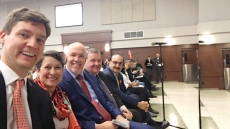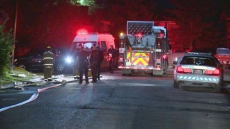TORONTO — A 95-year-old man who has had his citizenship revoked several times for lying about his membership in a Second World War Nazi death squad has lost yet another bid to have his case revisited.
The Federal Court of Appeal dismissed the latest legal action from Helmut Oberlander, whose case dates back to the 1990s.
Courts have repeatedly ruled that Oberlander's Canadian citizenship should be revoked on the grounds that he lied about his participation in a Nazi squad responsible for the deaths of nearly 100,000 people, although there has never been any evidence that he took part in atrocities.
The latest ruling had come from Federal Court Judge Michael Phelan last September, but Oberlander alleged the judge was biased because of previous involvement in the case and took the matter to the higher court.
A three-judge panel with the Federal Court of Appeal dismissed Oberlander's motion to have his case revisited in a written decision released Thursday.
"There is a strong presumption that judges will comply with their solemn judicial oath to administer justice impartially," the decision reads.
"This presumption is not easily rebutted, particularly where the previous decision in question which forms the foundation of the bias allegation took place a decade ago, under a different legal regime, and on a different record."
In June 2017, the federal government revoked Oberlander's Canadian citizenship for the fourth time since the mid 1990s. In doing so, the government maintained he was complicit in war crimes by belonging to Einsatzkommando 10a, known as Ek-10a.
The Ukraine-born Oberlander, who came to Canada in 1954 and became a citizen in 1960, has long argued he was conscripted into the unit as a 17-year-old and risked execution had he tried to leave. He has insisted he acted as an interpreter and took no part in its savagery.
Phelan was asked to rule on the government's citizenship revocation decision in September 2018. He found it reasonable to strip Oberlander of his Canadian citizenship for misrepresenting his war-time activities when he immigrated.
In reaching his conclusion, Phelan said a 2000 ruling from Federal Court Judge Andrew MacKay found Oberlander to have been aware of the unit's brutality and complicit in its war crimes by acting as an interpreter.
However, Oberlander's lawyers Ronald Poulton and Barbara Jackman argued that Phelan misinterpreted MacKay's decision and was in fact leaning on his own previous ruling from 2008 — one that was upended on appeal.
"Justice Phelan sat in judgment on his own previous finding," the lawyers argued.
The Federal Court of Appeal said judges frequently need to revisit their own work, adding that the lengthy amount of time that had elapsed between Phelan's two rulings was relevant.
The judges also noted that Phelan had to rely on different legal procedures in his two rulings, since the Supreme Court had changed the test for war crimes complicity in 2013.
"The Supreme Court changed the test ... from participation or indirect complicity to complicity based on a knowing, significant, and voluntary contribution," the decision reads. "The judicial review before Phelan in 2018 involved a different legal test than that which governed in 2008."



